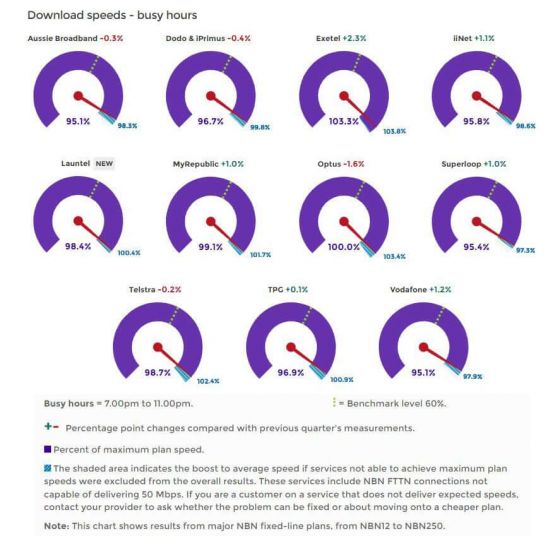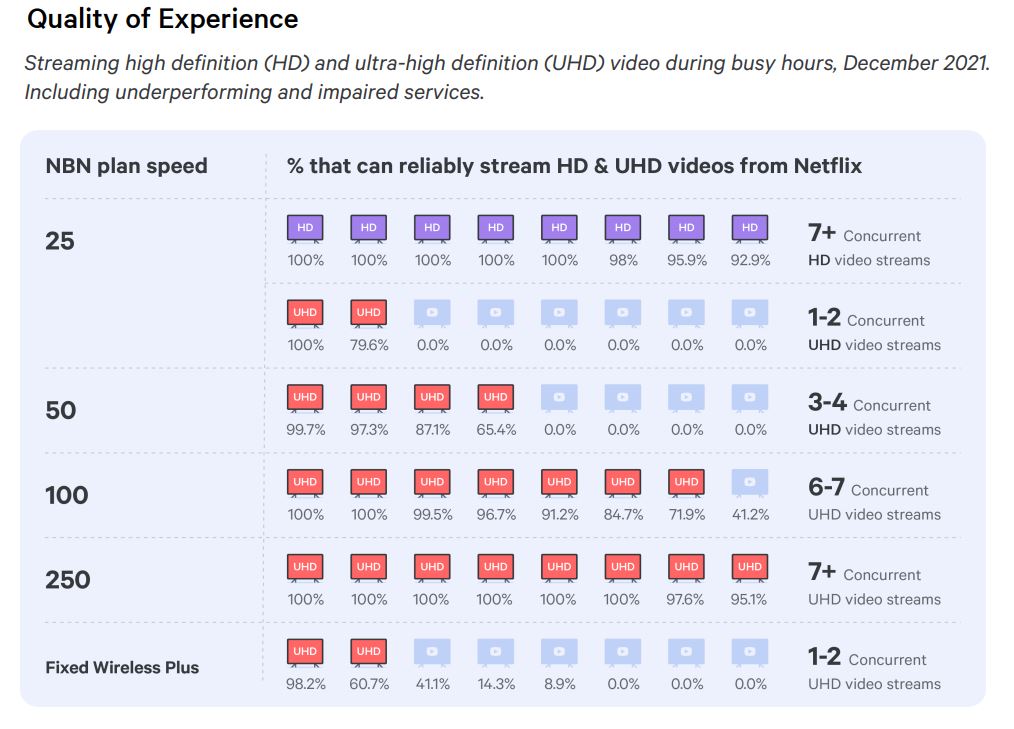The Australian Competition and Consumer Commission (ACCC) has dropped its latest quarterly report on NBN speeds, and once again an underdog provider has slid into the top spot. The 16th Measuring Broadband Australia report ranks the average download and upload speeds from 12 of Australia’s most popular telcos — and after losing out to Optus in December, smaller name Exetel is back at number one.
The ACCC looked at the average performance of included providers in the busy 7pm to 11pm evening period, with the bulk of the report focusing on fixed-line connections during December 2021. Results are shown as a percentage of the maximum attainable speed offered by each connection during peak hours; the closer to 100% a telco scored, the faster on average its plans performed.
Fastest NBN download speeds
According to the ACCC, customers on fixed-line connections (such as Fibre to the Node or Fibre to the Premises) experienced an average peak hour download speed of 97.4% during the December 2021 reporting period: a slight increase on the 97.2% result from the previous quarter. The latest report measures the performance of Telstra, Optus, TPG, Aussie Broadband, Vodafone, iiNet, Dodo & iPrimus, Exetel, Superloop, MyRepublic and Launtel to gauge how consistently each telco is performing.
In exciting news for more value-focused consumers, Exetel has returned to the number-one spot for download speeds in busy hours, hitting an average of 103.3% of its maximum advertised speed. Exetel regains first place from previous winner Optus, which dropped down to second with a still-excellent 100.0% result.
As NBN Co will often over-provision the download component of its most popular speed tiers, a result over 100% isn’t an anomaly. Rather, it’s an indication that a provider is delivering on its promised speeds for a large percentage of its customers, even during heavy traffic periods.
The full download speed results are:
- Exetel: 103,3%
- Optus: 100.0%
- MyRepublic: 99.1%
- Telstra: 98.7%
- Launtel: 98.4%
- TPG: 96.9%
- Dodo & iPrimus: 96.7%
- iiNet: 95.8%
- Superloop: 95.4%
- Aussie Broadband: 95.1%
- Vodafone: 95.1%
Coming in third with 99.1% is another smaller name, MyRepublic, with Telstra in fourth place at 98.7%. New entrant Launtel debuted in fifth place with a commendable 98.4% score, which did not go unnoticed by the ACCC.
“Having an emerging retailer with above average results to the larger telcos is good news for consumers and competition in the residential broadband market,” said ACCC Commissioner Anna Brakey.

The ACCC’s report also looked at how ‘very high speed’ NBN service — i.e. NBN 250 and NBN 1000 plans — performed on average, noting that these connections tended to vary in speeds during evening peak hours. Although overall average speeds are improving, the difference between the daily maximum speed and the average speed at 8pm is around 128Mbps — far greater than for other speed tiers, including NBN 100.
Of the 26,902 tests performed on high-speed NBN 1000 plans in December 2021, 48.4% achieved a download speed of least 900Mbps. On average, peak hour speeds sit at around 700Mbps from 7pm to 8pm, climbing back to the 800Mbps mark at around 10.30pm.
Compare NBN plans
If you’re looking to see how these telcos stack up on price and features, you can compare unlimited data NBN 50 plans below.
The following table shows a selection of published unlimited Standard Plus Evening Speed (NBN 50) plans from Canstar Blue’s database, listed in order of standard monthly cost, from the lowest to highest and then by data allowance, largest to smallest. Use our NBN comparison tool see plans from a range of other providers. This is a selection of products with links to a referral partner.
Fastest Netflix speeds
With the demand for fast speeds being heavily driven by the rise in streaming entertainment, it makes sense that the ACCC would also look at how NBN plans can handle high-definition video streaming. Measuring Broadband Australia reports now include info on how well fixed-line connections can support multiple HD and ultra-HD streams.
Previously, the ACCC broke this data down by provider. However, this quarter’s report instead focuses on the performance of each speed tier as a whole, so individual telco averages aren’t known. During December, the ACCC found that 99.7% of NBN 50 plans tested could support one ultra-HD stream, 100% of NBN 100 plans could support two simultaneous streams, and 100% of NBN 250 tests supported six concurrent ultra-HD streams, as shown below.

Fastest NBN upload speeds
Upload speeds remain similar to last quarter, with an overall average performance of 85.0% and a busy-hour average of 84.6%. Exetel also took home first place for uploads, averaging 88.9% in busy hours, followed by newbie Launtel and old hand Optus, both at 86.3%.
The full upload speed results are:
- Exetel: 88.9%
- Launtel: 86.3%
- Optus: 86.3%
- MyRepublic: 85.8%
- Telstra: 85.4%
- Superloop: 85.3%
- Dodo & iPrimus: 84.8%
- Vodafone: 84.5%
- TPG: 83.6%
- Aussie Broadband: 82.7%
- iiNet: 82.6%
NBN fixed wireless plans: download speeds on the rise
Alongside measuring fixed-line broadband speeds, the ACCC’s report also looks at the performance of NBN fixed wireless, which caters to homes in regional areas where fibre connections aren’t available. In good news, average download speeds on fixed wireless plans have significantly improved over the past 12 months; connections were able to achieve 93.4% of the maximum available speed on average in the ACCC’s latest report, compared to just 78.5% in December 2020. Looking at the busy evening hours, fixed wireless plans met 79.8% of the maximum in December 2021, up from 68.4% a year earlier.
ACCC attributes this speed boost to changes introduced by NBN Co in July, which saw the network allow a 15% over-provisioning of downloads on fixed wireless NBN plans. However, while download speeds are up for fixed wireless and faster Fixed Wireless Plus services — with some Plus plans now achieving peak speeds of more than 80Mbps — upload speeds have remained disappointing, with a current average of 48.9% of the maximum achievable speed.
“It is pleasing to see consumers on NBN’s fixed wireless networks are also benefiting from the improved download speeds that we have seen on the NBN fixed-line network,” said Ms. Brakey.
“Upload speeds, however, which are increasingly important for a range of applications including working from home, gaming and sharing files, are generally flat on both fixed-line and fixed wireless.”


Share this article